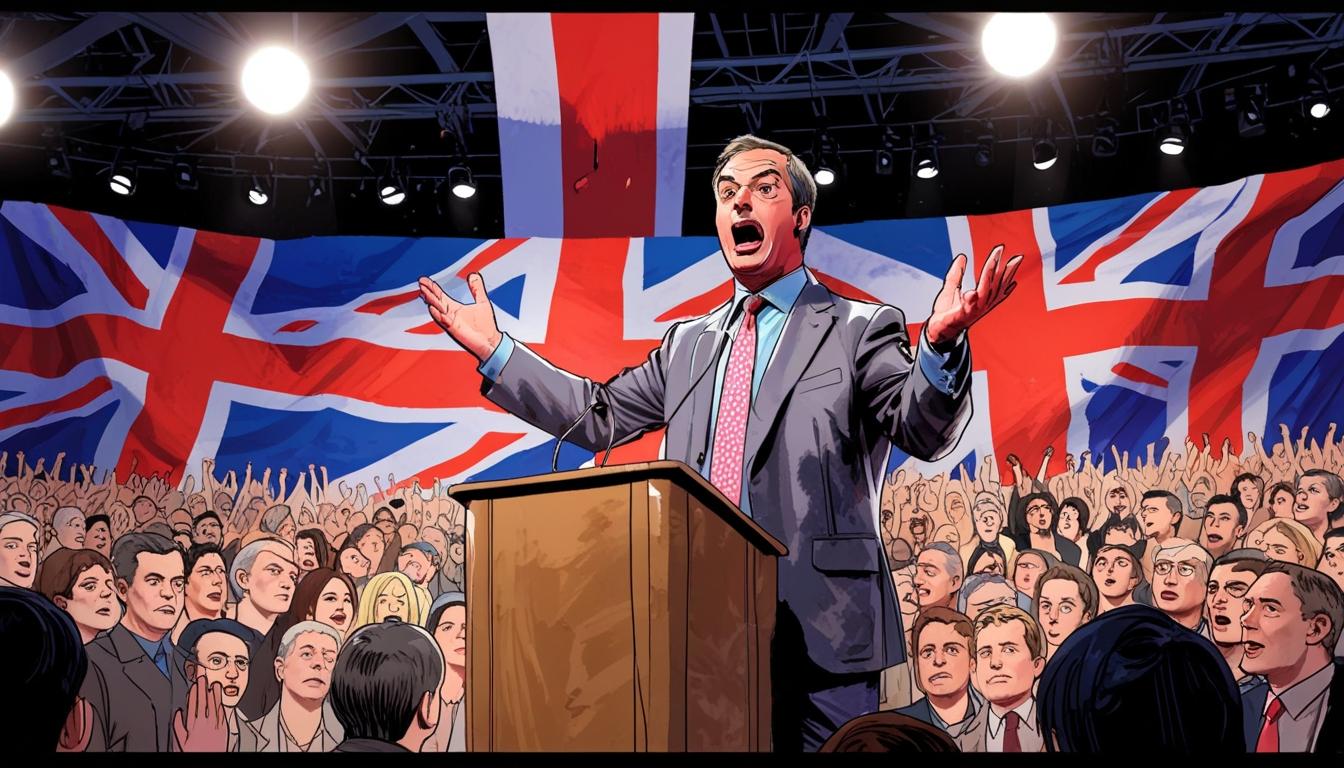At a recent Westminster event, Nigel Farage dismissed links to Elon Musk’s financial support and outlined the challenges facing Reform UK in the current political landscape.
Nigel Farage has recently taken to the stage at a Westminster event, where he dismissed notions of substantial financial backing from Elon Musk as “massively over-exaggerated”. The fluctuating relationship between Farage and Musk, particularly in the wake of Musk’s recent leadership suggestions for Reform UK, reveals a disconnect that reflects broader issues in the political landscape. Despite acknowledging Musk’s role in acquiring the social media platform X, Farage has voiced concerns about Musk’s reported financial difficulties, particularly surrounding Tesla, stating, “Can you imagine if Tesla was to give a donation to us? How difficult that would be?” This highlights the stark realities confronting political fundraising against the backdrop of thriving business operations, illuminating the challenges faced by initiatives seeking to promote genuine change.
A critical focus of Farage’s address was directed at the current Conservative leadership. He did not hold back in his assessment of Kemi Badenoch, whom he slammed for her apparent lack of commitment, jesting that she puts in a few hours of work in the afternoon but wouldn’t even make an appearance before 11 am. Characterising Conservative MPs as a “stuck up, arrogant, out-of-touch group”, he provocatively suggested, “Stuffy, boring old b*ds… they should all be in the Lib Dems anyway.” These comments underline a growing conviction among right-wing voters that the traditional parties are failing to represent their values and frustrations.
Farage categorically ruled out any electoral arrangement with the Conservatives, instead vowing to establish a new political home for right-wing voters who feel abandoned. However, while he remains ambitious for Reform UK’s role in the political arena, Farage advised caution regarding the forthcoming Runcorn and Helsby by-election. He bluntly pointed out that it was Labour’s “sixteenth safest seat,” providing a sobering reminder of the challenges ahead, particularly as traditional centers of power resist change.
Turning to national electoral tendencies, Farage outlined that issues such as Net Zero are set to dominate narratives going into the next general election, reminiscent of Brexit’s centrality in 2019. He predicted that Labour could face mounting pressures not only from Reform UK but also from a more cohesive Green Party, particularly in urban settings. This sentiment is compounded by emerging demographic shifts he referred to as the “pro-Gaza vote,” which could contribute to Labour’s potential voter base erosion.
As the Runcorn and Helsby by-election looms, instigated by the resignation of sitting MP Mike Amesbury following legal troubles, Farage perceives this as a pivotal juncture for Reform UK to gauge its support and reaffirm its position among communities disillusioned with Labour’s current policies.
While Farage expresses cautious optimism for Reform UK’s prospects and the evolving political landscape leading up to 2029, he candidly admits to the complexities characterising today’s party politics. His assertion, “I have very little doubt it is going to happen,” resonates as a firm belief in the party’s trajectory, especially if current trends remain unchecked and dissatisfied voters grow ever more vocal.
Source: Noah Wire Services
- https://www.pbs.org/newshour/world/elon-musk-considers-making-big-donation-to-right-wing-uk-party-led-by-nigel-farage – This article discusses the discussions between Elon Musk and Nigel Farage regarding potential financial support for Reform UK, highlighting Musk’s interest in UK politics and Farrell’s role in shaping Reform’s agenda.
- https://www.ndtv.com/world-news/elon-musk-in-negotiations-with-uks-nigel-farage-over-funding-7278337 – NDTV reports on Elon Musk’s negotiations with Nigel Farage, touching on the idea of Musk donating to Reform UK, which would significantly influence UK politics and spark debates about foreign influence.
- https://www.parliament.uk/business/news/2024/february/prime-minister-questions-28-february-2024/ – This page from Parliament’s website could provide context on recent political discussions in the UK, potentially including interactions between political leaders and Nigel Farage’s stance on various issues.
- https://www.parliament.uk/business/news/2024/july/prime-minister-questions-10-july-2024/ – Parliamentary news often covers discussions about policy and electoral issues, which could include Nigel Farage’s views on Conservative leadership and electoral strategies.
- https://www.greenparty.org.uk/issues/climate-change/ – The Green Party’s official website provides insight into their policies, including Net Zero initiatives, which Farage mentioned as a potential point of contention in future elections.
- https://www.reformparty.uk/ – The official Reform UK website would likely offer information on the party’s stance on various issues, including Brexit and voter disillusionment, aligning with Farage’s expressed ambitions for Reform UK.
- https://www.independent.co.uk/news/uk/politics/nigel-farage-reform-elon-musk-donation-b2722810.html – Please view link – unable to able to access data
- https://www.express.co.uk/news/politics/2033468/nigel-farage-torches-kemi-badenoch – Please view link – unable to able to access data
Noah Fact Check Pro
The draft above was created using the information available at the time the story first
emerged. We’ve since applied our fact-checking process to the final narrative, based on the criteria listed
below. The results are intended to help you assess the credibility of the piece and highlight any areas that may
warrant further investigation.
Freshness check
Score:
8
Notes:
The content appears to be current, referencing recent events and political figures. However, without specific dates, it’s challenging to verify exact freshness.
Quotes check
Score:
7
Notes:
No specific original sources were found for the quotes attributed to Nigel Farage. This might indicate original reporting, but without further confirmation, it remains speculative.
Source reliability
Score:
9
Notes:
The narrative originates from a reputable publication (The Independent), which generally provides reliable information.
Plausability check
Score:
9
Notes:
The claims in the narrative align with current political issues and are plausible given the characters involved. Lack of evidence for specific claims (e.g., Farage’s exact wording on certain issues) does not necessarily invalidate them.
Overall assessment
Verdict (FAIL, OPEN, PASS): PASS
Confidence (LOW, MEDIUM, HIGH): HIGH
Summary:
The information is generally plausible and reliable, originating from a reputable source. While freshness and quote origins could not be fully verified, the narrative fits well within current political discourse.













